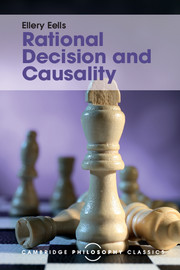Book contents
- Frontmatter
- Dedication
- Contents
- Preface to this edition
- Preface
- Introduction
- 1 Bayesianism
- 2 The philosophical and psychological significance of Bayesian
- 3 Bayesian decision theories: some details
- 4 The counterexamples
- 5 Causal decision theories
- 6 Common causes, reasons and symptomatic acts
- 7 A general defense of PMCEU
- 8 Newcomb's paradox
- Appendix 1 Logic
- Appendix 2 Probability
- Bibliography
- Index
Preface to this edition
Published online by Cambridge University Press: 05 July 2016
- Frontmatter
- Dedication
- Contents
- Preface to this edition
- Preface
- Introduction
- 1 Bayesianism
- 2 The philosophical and psychological significance of Bayesian
- 3 Bayesian decision theories: some details
- 4 The counterexamples
- 5 Causal decision theories
- 6 Common causes, reasons and symptomatic acts
- 7 A general defense of PMCEU
- 8 Newcomb's paradox
- Appendix 1 Logic
- Appendix 2 Probability
- Bibliography
- Index
Summary
In 1969 Robert Nozick published Newcomb's Problem and Two Principles of Choice. At the time most philosophers were familiar with the decision theory of Richard Jeffrey. In Jeffrey's theory, the subjective expected utility of an act is an average of possible payoffs, weighted by degrees-of-belief of getting the payoff conditional on performing the act. Nozick framed the problem as a collision between Jeffrey's expected utility theory and the principle of dominance. Dominance says that if act A is better than act B in each possible circumstance, it is better overall.
In Newcomb's problem, and a host of similar problems, A is better than B no matter how the world is at the time of decision, but doing B is a sign or symptom that in the past something has happened with large favorable payoff consequences.
Beliefs about signs or symptoms show up in conditional degrees of belief and thus in Jeffrey's expected utility. Which act is choiceworthy in such a situation? Philosophers split up into camps defending one answer or another.
Those of us who thought that choiceworthiness should pay attention to causal consequences of an act and ignore the act's diagnostic or symptomatic status formulated various forms of causal decision theory: Bob Stalnaker, Allan Gibbard and Bill Harper, and David Lewis incorporated subjunctive conditionals in the expectation; I used a partition of possible causal backgrounds. It soon became clear that with some auxiliary assumptions these were all the same theory. Representation theorems for causal decision theory were later proved by Brad Armendt and by Jim Joyce. It also became clear that, given the right reading, the decision theory of L. J. Savage can be viewed as causal decision theory. Jeffrey's decision theory became known as evidential decision theory, in contrast to causal decision theory. Is the choiceworthiness of an act to be evaluated by viewing it as evidence or as cause?
Those who fought over the correct act in the Newcomb problem now took sides in the battle between evidential and causal decision theory. It is noteworthy that the architect of evidential decision theory, Richard Jeffrey, did not join the ranks of those defending apparent conclusions of evidential decision theory. He thought that causal decision theory gave the right answer.
- Type
- Chapter
- Information
- Rational Decision and Causality , pp. ix - xPublisher: Cambridge University PressPrint publication year: 2016



